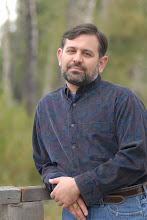This is a passive form of medicine and part of the answer to this approach was to develop screening tests. This is a great idea. It's what we do in endobiogenic medicine all the time with the biology of functions lab tests. But, the way this has been done is to take one single factor that is considered to be "the" cause or "the" indicator of some disease--like a cancer--and measure that in everyone, or those determined to be at risk.
Unfortunately, by trying to be progressive, by trying to be preventative, this approach has suffered from the same reductionist tendencies that were problematic in the first place. For example, the idea that a microbe alone is the cause of an illness rather than the result of an imbalanced internal terrain.
In terms of prostate cancer, for example, Prostate specific antigen (PSA) was determined to be the cause that was specific and sensitive for prostate cancer. What my mentor and co-developer of the endobiogenic system, Dr. Jean Claude Lapraz has said for over 10 years is that PSA is not enough to be an indicator of prostate cancer, especially when it is only mildly or moderately elevated. It is only an indicator of prostate congestion and a disturbance in factors related to prostate growth. Now, why that prostate is enlarged is a different matter all together.
Dr. Otis Brawley, chief medical officer of the The American Cancer Society, had the bravery to admit,
“We don’t want people to panic,” said Dr. Otis Brawley, chief medical officer of the cancer society. “But I’m admitting that American medicine has over-promised when it comes to screening. The advantages to screening have been exaggerated.”
The article in the New York Times in which he is quoted goes on to say that screening for prostate and breast cancer has not prevented the more severe types of cancer which cause death, but has only increased diagnosed mild, local cancers, some of which are benign and will go away on their own. Unfortunately, with increased diagnosis of possibly benign cancers has come an increase in not so benign medical interventions, such as CT scan (read radiation exposure) biopsies.
Let me reiterate again the importance of having an integrative understanding of the myriad factors that can influence the development of a cancer. When a patient has a "fascinoma"--a fascinating finding to a physician with questionable clinical significance--from an imaging study, an executive health check up, body scan, etc.--it induces fear in them, but it does not clarify what it is, where it came from, why it is there and whether or not it is benign, potentially harmful or currently harmful.
The amazing thing about the biology of functions, the biological testing service of the endobiogenic method, is that it can answer all these questions in most cases of cancer. By evaluating all the factors that can cause a cancer to develop, and by taking a careful history and physical to understand the intervening factors, we can develop a very sophisticated understanding of how to understand an elevated PSA level, a suspicious lump in the breast, or a person's risk of cancer developing again.
A man I knew came to me because his doctors at the VA hospital found a fascinoma--a suspicious lump on a lung and his adrenal glands on a CT scan, quite by accident. They were very concerned that it may be a cancer given his long history of smoking. He categorically refused a biopsy. He came to me and we performed a biology of functions, which showed that it was not cancerous, but simply an overgrowth of a certain type of tissue due to a different non-cancerous pathology, which we treated with medical plants.
A woman was living with breast cancer for 14 years which she only treated with a lumpectomy and localized radiation one time, but never chemotherapy. She came to me in this state and we performed a biology of functions, which showed the cancer, but also indicated that it was like a crouching tiger ready to spring into a state of metastasis and spread beyond the local area that somehow her body had contained it in for all those years. We started a medical plan treatment plan which unfortunately she did not continue and she was diagnosed 3 months later with metastasis to the local lymph nodes and lungs.
In both cases, the biology of functions was clear and accurate to the cause and direction of a concerning situation. In the first case, we were able to avoid unnecessary intervention. In the second case, it has a grave result due to a lack of concerted action.
I am not saying that people should not receive blood screening for cancer. Quite the contrary. What I am saying is that screening needs to be based on understanding the factors (plural) that are involved in the risk for cancer in general, as well as particular cancers.
The biology of functions gives you a full cancer evaluation panel routinely, and for people who are cancer survivors, who have a strong family history of cancer, or who are generally very concerned about cancer, we measure important cancer antigens such as PSA, CEA, CA 15-3, CA 19-9 and CA 125 which can tell us about early disturbances in certain orgain systems, such as the prostate, ovaries, breasts, etc. but in general which hormonal system is playing the biggest role in general internal imbalance and where to put the emphasis of our treatment and preventative care.



